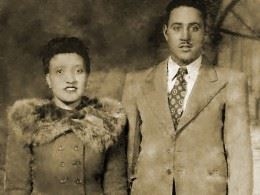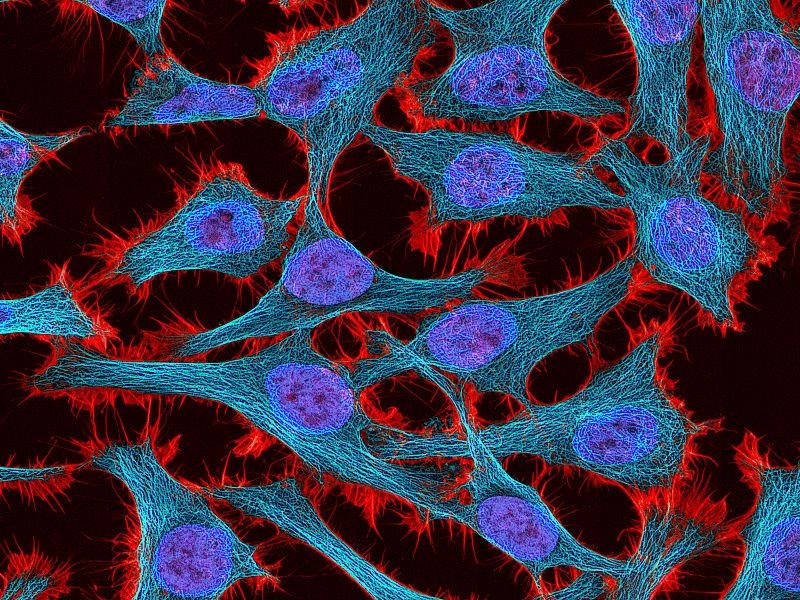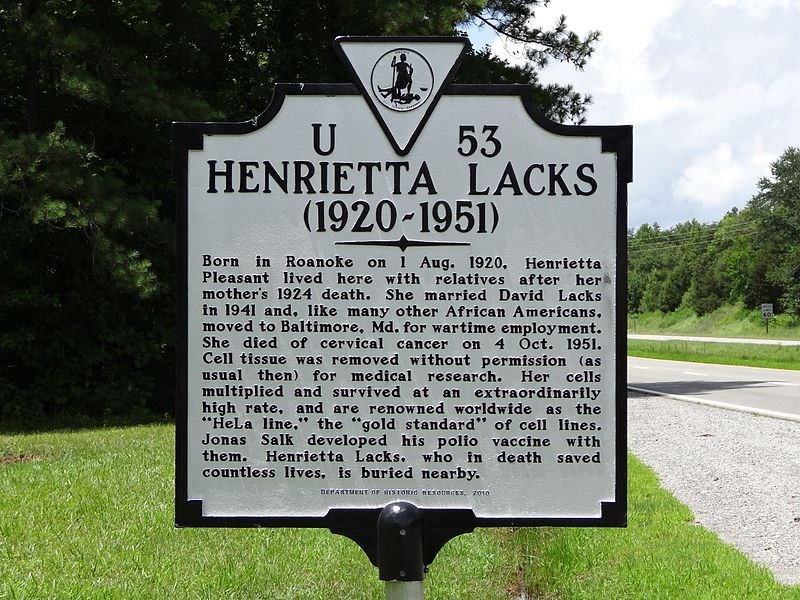"A lot of people don't believe it. But you can have eternal life. Just look at Henrietta" -Rebecca Skloot
Henrietta Lacks, The True Immortal Hero of Many
 Henrietta Lacks and her husband David Lacksown [Public domain]Everything from hemophilia, herpes, influenza, leukemia, Parkinson's disease, as well as the polio vaccine, the cancer drug tamoxifen, chemotherapy, gene mapping, and in vitro fertilization, are all things that Henrietta Lacks has been able to contribute to society. The big bang that started this was when she was diagnosed with cervical cancer and traveled to Johns Hopkins for treatment where her cells were unknowingly taken from her and tested to become the first ever known immortal human cells. They were the first cells that were able to grow outside of the human body. After she passed away because of the cancer, further testing and experimenting was performed on her cells to be able to make so many incredible medical breakthroughs. Because of her groundbreaking contributions to the scientific world, and her difficult upbringing which made her a stronger person, Henrietta Lacks is a true hero.
Henrietta Lacks and her husband David Lacksown [Public domain]Everything from hemophilia, herpes, influenza, leukemia, Parkinson's disease, as well as the polio vaccine, the cancer drug tamoxifen, chemotherapy, gene mapping, and in vitro fertilization, are all things that Henrietta Lacks has been able to contribute to society. The big bang that started this was when she was diagnosed with cervical cancer and traveled to Johns Hopkins for treatment where her cells were unknowingly taken from her and tested to become the first ever known immortal human cells. They were the first cells that were able to grow outside of the human body. After she passed away because of the cancer, further testing and experimenting was performed on her cells to be able to make so many incredible medical breakthroughs. Because of her groundbreaking contributions to the scientific world, and her difficult upbringing which made her a stronger person, Henrietta Lacks is a true hero.
Due to Henrietta’s cervical cancer and treatment at Johns Hopkins hospital in Baltimore, she was able to contribute so many wonderful medical and scientific advancements which was able to help save many people. Which made her able to help other people in the way that scientists have been able to use her cells for research “[Her cells] became the first human cells to live indefinitely outside the body. They helped eradicate polio, flew in early space shuttle missions and sat in nuclear test sites around the world. HeLa cells helped researchers understand the differences between cancerous and normal cells, and quickly became a standard laboratory tool for studying the effects of radiation, growing viruses and testing medications. HeLa is still one of the most widely used cell lines; in fact, this year's Nobel Prize in Physiology or Medicine was awarded for research in which HeLa cells played a pivotal role” (Skloot, “Cells”).
 Henrietta Lacks HeLa CellsNational Institutes of Health (NIH) [Public domain]It is incredible how much HeLa cells have done for our world. They not only have helped scientists to have a better understanding of cells, but have also helped to erase the disease, help in laboratories, and they are still used all the time, everywhere, they have even won a Nobel Prize. Thanks to Henrietta, her cells have done wonders for people but just continue to be empowering in the way they help people: "Scientists are using technology her cells helped to develop to grow other people's corneas. ‘That’s a miracle,’” (Skloot, Immortal Life, 162). Not only are Henrietta’s cells used to cure diseases, they are helping to build someone else’s cornea, she is giving random strangers the gift of sight. This is not only groundbreaking medical advancements, but also an incredible thing to happen thanks to the famous HeLa cells from Mrs. Henrietta Lacks. There have been many discoveries which has made Henrietta herself so unbelievably groundbreaking in ways that many people fathom because of her story. She will continue to help so many more people with the incredible findings to occur.
Henrietta Lacks HeLa CellsNational Institutes of Health (NIH) [Public domain]It is incredible how much HeLa cells have done for our world. They not only have helped scientists to have a better understanding of cells, but have also helped to erase the disease, help in laboratories, and they are still used all the time, everywhere, they have even won a Nobel Prize. Thanks to Henrietta, her cells have done wonders for people but just continue to be empowering in the way they help people: "Scientists are using technology her cells helped to develop to grow other people's corneas. ‘That’s a miracle,’” (Skloot, Immortal Life, 162). Not only are Henrietta’s cells used to cure diseases, they are helping to build someone else’s cornea, she is giving random strangers the gift of sight. This is not only groundbreaking medical advancements, but also an incredible thing to happen thanks to the famous HeLa cells from Mrs. Henrietta Lacks. There have been many discoveries which has made Henrietta herself so unbelievably groundbreaking in ways that many people fathom because of her story. She will continue to help so many more people with the incredible findings to occur.
Henrietta Lacks grew up in the harshest time of segregation in the South. She was raised without medical care and went to “black” schools and restrooms where white people treated her poorly and lesser. Henrietta did not let these people get to her and made her a resilient and emotionally powerful woman. Due to her poor family, she grew up without much medical care. When she did have an issue, she always put it off and pushed it away until it was really something serious. So, when she grew older and realized that she was having problems that needed to be addressed she,“[Lacks] had begun to feel pains in her womb. She initially attributed this to her recent childbirth or a sexually transmitted disease, and she did not visit a doctor...Lacks believed that she had found a hard lump inside her body and decided it was time to seek medical attention” (“Henrietta Lacks”). Henrietta grew up poor and it was difficult to seek medical attention so when there was something wrong, she paid little attention to it and brushed it aside. Only when she finds a lump on her cervix, does she decide to finally go in to get it looked at. Science is grateful that she does because, although she doesn’t know it, she is about to make incredible history in the world of medicine. Due to Henrietta’s heritage, she was doomed from the start. Not only growing up in a poor family, but, as an adult she also was not wealthy: “Henrietta Lacks was the great-great-granddaughter of a slave and was herself a tobacco farmer whose family remained poor, with some members not having health insurance despite her cells leading to a medical revolution” (Hassan). Henrietta was a slave descendent and a tobacco farmer considering the way that she was brought up and raised, this formed her to be able to take care of her family with the difficult life that was paved for her. She was selfless in the way that her family never demanded compensation for the miracles that were created because of her own cells. Since Henrietta was also an African American, she suffered a difficult life. “As an African-American woman in the pre-civil rights era, cancer treatment and medical research were not done like they are today” (Virginia Department of Health). Growing up poor, being an African American woman, and having to be treated at a white dominated hospital, she was one who had to stay strong and fight for what she deserved. Even so, the doctors did not take much attention to her and died of overexposure to the chemo radiation which over time ate away and destroyed her body. Henrietta was forced to grow up and mature fast being an African American woman before the Civil Rights Act causing her to not be able to get the medical attention she needed, it pushed her to be a strong individual, emotionally and physically.
 Henrietta Lacks Historical MarkerEmw [CC BY-SA 3.0 (https://creativecommons.org/licenses/by-sa/3.0)]Henrietta Lacks has proven time and time again that she is a hero in so many ways with her unbelievable contributions to the medical and science world and the way that she was able to overcome her difficult childhood made her such a capable and inspiring person. Henrietta continues to inspire people everyday by her cells having paved the path for medicine to advance strongly and keep other people alive and healthy although she, herself, cannot be here today to see how much of an impact she has left on the world and the science community, “She [Henrietta’s daughter, Deborah Lacks] is in the process of signing up for basic courses at a local community center in Baltimore in the hope that they will lead her toward college. She is not sure what degree she will pursue, but she knows for sure what she will study: science” (Skloot, “Cells”). Not only is Henrietta an inspiration to scientists, women, and African Americans, but also, to her daughter, Deborah Lacks. Deborah never got to know her mother being that she died when Deborah was only two years old. No matter, Deborah and her family was informed about their mother’s cells and how and why they are being used, but that wasn’t enough. In order to develop a deeper understanding of what was going on with her mother’s cells, Deborah decided to go to school and study science. She wrote every definition of everything related to cells and began from there. Next, she went on to sign up for courses at a community college in hopes of going college. Thanks to her mother and her cells she has pushed Deborah and other people like her to understand and hold themselves accountable for their learning to become a better informed human.
Henrietta Lacks Historical MarkerEmw [CC BY-SA 3.0 (https://creativecommons.org/licenses/by-sa/3.0)]Henrietta Lacks has proven time and time again that she is a hero in so many ways with her unbelievable contributions to the medical and science world and the way that she was able to overcome her difficult childhood made her such a capable and inspiring person. Henrietta continues to inspire people everyday by her cells having paved the path for medicine to advance strongly and keep other people alive and healthy although she, herself, cannot be here today to see how much of an impact she has left on the world and the science community, “She [Henrietta’s daughter, Deborah Lacks] is in the process of signing up for basic courses at a local community center in Baltimore in the hope that they will lead her toward college. She is not sure what degree she will pursue, but she knows for sure what she will study: science” (Skloot, “Cells”). Not only is Henrietta an inspiration to scientists, women, and African Americans, but also, to her daughter, Deborah Lacks. Deborah never got to know her mother being that she died when Deborah was only two years old. No matter, Deborah and her family was informed about their mother’s cells and how and why they are being used, but that wasn’t enough. In order to develop a deeper understanding of what was going on with her mother’s cells, Deborah decided to go to school and study science. She wrote every definition of everything related to cells and began from there. Next, she went on to sign up for courses at a community college in hopes of going college. Thanks to her mother and her cells she has pushed Deborah and other people like her to understand and hold themselves accountable for their learning to become a better informed human.
Henrietta has personally inspired myself and my family because of the work that we have been able to do with her cells. My dad works at a pharmaceutical company in which he experiments with her cells quite often. I recently used them for an experiment in my biomed elective where we were able to find her cells and examine them. This has made me more interested in the science field and finding revolutionary results. I know how absolutely amazing it is that she has been able to change so many people’s lives, it is almost as if she gets to make other people’s lives better because she had such a challenging one.
Works Consulted
Hassan, Adeel. "Henrietta Lacks." New York Times, 11 Mar. 2018, p. F13(L). Biography In
Context,https://link.galegroup.com/apps/doc/A530505641/BIC?u=powa9245&sid=BIC&x
id=9fe5527c. Accessed 26 Mar. 2019.
Skloot, Rebecca. "Cells that save lives are a mother's legacy. (Deborah Lacks, who works on cells
taken from her dying mother)." New York Times, 17 Nov. 2001, p. A2. Biography In \
Context,https://link.galegroup.com/apps/doc/A80181163/BIC?u=powa9245&sid=BIC&xi
d=58dc18df. Accessed 26 Mar. 2019.
SKLOOT, REBECCA. IMMORTAL LIFE OF HENRIETTA LACKS. PICADOR, 2018.
“Virginia Department of Health.” Go to Virginia Department of Health.,
www.vdh.virginia.gov/health-equity/henrietta-lacks-legacy-week/.
Page created on 4/8/2019 9:20:26 PM
Last edited 4/15/2019 5:35:36 PM
